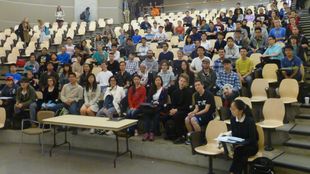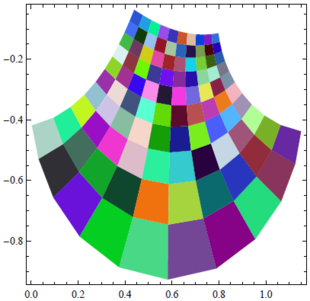|
|
| Line 45: |
Line 45: |
|
|
|
|
|
|
|
|
|
:::::::<math>(-1)det\begin{pmatrix}...\\A_(i + 1)\\A_i\\...\\A_j\\...\end{pmatrix} = det\begin{pmatrix}...\\A_i\\A_{i + 1}\\...\\A_j\\...\end{pmatrix} = (-1)det\begin{pmatrix}...\\A_{i + 1}\\A_i\\...\\A_j\\...\end{pmatrix} = (-1)^{j - i}det\begin{pmatrix}...\\A_{i + 1}\\...\\A_j\\A_i\\...\end{pmatrix} =</math> |
|
:::::::<math>(-1)det\begin{pmatrix}...\\A_(i + 1)\\A_i\\...\\A_j\\...\end{pmatrix} = det\begin{pmatrix}...\\A_i\\A_{i + 1}\\...\\A_j\\...\end{pmatrix} = (-1)det\begin{pmatrix}...\\A_{i + 1}\\A_i\\...\\A_j\\...\end{pmatrix} =</math> |
|
|
|
|
|
|
|
|
|
|
|
|
|
:::::::<math>(-1)^{j - i}(-1)^{j - i - 1}det\begin{pmatrix}...\\A_j\\A_{i + 1}\\...\\A_i\\...\end{pmatrix} = (-1)^{2(j - i) - 1}det\begin{pmatrix}...\\A_j\\A_{i + 1}\\...\\A_i\\...\end{pmatrix} = (-1)^{- 1}det\begin{pmatrix}...\\A_j\\A_{i + 1}\\...\\A_i\\...\end{pmatrix} =</math> |
|
:::::::<math>(-1)^{j - i}det\begin{pmatrix}...\\A_{i + 1}\\...\\A_j\\A_i\\...\end{pmatrix} = (-1)^{j - i}(-1)^{j - i - 1}det\begin{pmatrix}...\\A_j\\A_{i + 1}\\...\\A_i\\...\end{pmatrix} =</math> |
|
|
|
|
|
|
|
|
|
|
|
|
|
:::::::<math>(-1)det\begin{pmatrix}...\\A_j\\A_{i + 1}\\...\\A_i\\...\end{pmatrix} = -det(B)</math>. |
|
:::::::<math>(-1)^{2(j - i) - 1}det\begin{pmatrix}...\\A_j\\A_{i + 1}\\...\\A_i\\...\end{pmatrix} = (-1)^{- 1}det\begin{pmatrix}...\\A_j\\A_{i + 1}\\...\\A_i\\...\end{pmatrix} = (-1)det\begin{pmatrix}...\\A_j\\A_{i + 1}\\...\\A_i\\...\end{pmatrix} =</math> |
|
|
|
|
|
|
|
|
|
|
|
:::::::<math>-det(B)</math>. |
|
|
|
|
|
|
|
|
Revision as of 16:54, 7 December 2014
Welcome to Math 240!
(additions to this web site no longer count towards good deed points)
|
| #
|
Week of...
|
Notes and Links
|
| 1
|
Sep 8
|
About This Class, What is this class about? (PDF, HTML), Monday, Wednesday
|
| 2
|
Sep 15
|
HW1, Monday, Wednesday, TheComplexField.pdf,HW1_solutions.pdf
|
| 3
|
Sep 22
|
HW2, Class Photo, Monday, Wednesday, HW2_solutions.pdf
|
| 4
|
Sep 29
|
HW3, Wednesday, Tutorial, HW3_solutions.pdf
|
| 5
|
Oct 6
|
HW4, Monday, Wednesday, Tutorial, HW4_solutions.pdf
|
| 6
|
Oct 13
|
No Monday class (Thanksgiving), Wednesday, Tutorial
|
| 7
|
Oct 20
|
HW5, Term Test at tutorials on Tuesday, Wednesday
|
| 8
|
Oct 27
|
HW6, Monday, Why LinAlg?, Wednesday, Tutorial
|
| 9
|
Nov 3
|
Monday is the last day to drop this class, HW7, Monday, Wednesday, Tutorial
|
| 10
|
Nov 10
|
HW8, Monday, Tutorial
|
| 11
|
Nov 17
|
Monday-Tuesday is UofT November break
|
| 12
|
Nov 24
|
HW9
|
| 13
|
Dec 1
|
Wednesday is a "makeup Monday"! End-of-Course Schedule, Tutorial
|
| F
|
Dec 8
|
The Final Exam
|
| Register of Good Deeds
|

Add your name / see who's in!
|

|
|
Boris
Theorem
Let  be a
be a  matrix and
matrix and  be the matrix
be the matrix  with two rows interchanged. Then
with two rows interchanged. Then  . Boris decided to prove the following lemma first:
. Boris decided to prove the following lemma first:
Lemma 1
Let  be a
be a  matrix and
matrix and  be the matrix
be the matrix  with two adjacent rows interchanged. Then
with two adjacent rows interchanged. Then  .
.
All we need to show is that  . Assume that
. Assume that  is the matrix
is the matrix  with rows
with rows  of
of  interchanged. Since the determinant of a matrix with two identical rows is
interchanged. Since the determinant of a matrix with two identical rows is  , then:
, then:


 .
.
Since the determinant is linear in each row, then we continue where we left off:


 .
.
Then  and
and  . The proof of the lemma is complete.
. The proof of the lemma is complete.
For the proof of the theorem, assume that  is the matrix
is the matrix  with row
with row  of
of  interchanged with row
interchanged with row  of
of  and that
and that  . By Lemma 1, we have the following:
. By Lemma 1, we have the following:




 .
.
Then the proof of the theorem is complete.
Nikita





















